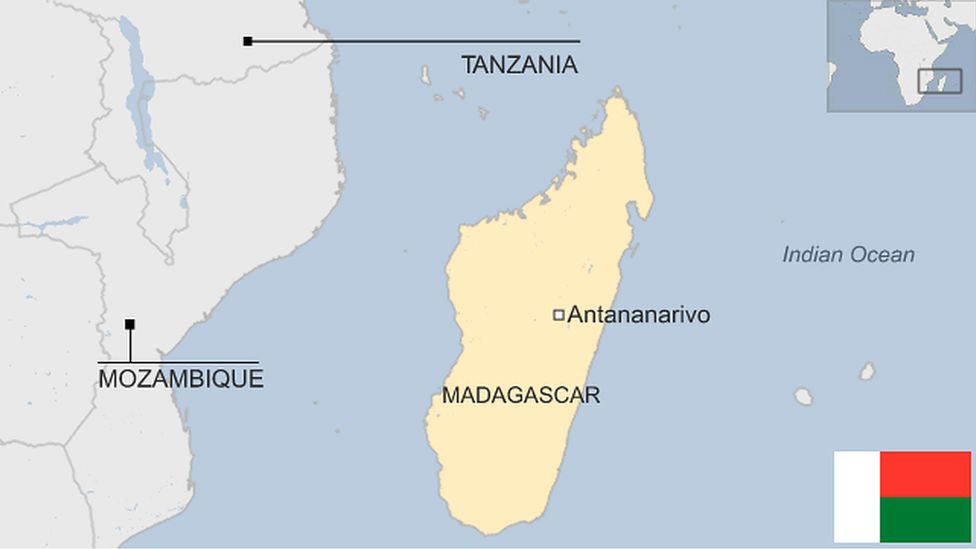Madagascar country profile
- Published

Situated off the southeast coast of Africa, Madagascar is the fourth largest island in the world. Having developed in isolation, the island nation is famed for its unique wildlife.
Traditionally, the economy has been based on the cultivation of paddy rice, coffee, vanilla and cloves.
Yet despite a wealth of natural resources and a tourism industry driven by its unique environment, it remains one of the world's poorest and is heavily dependent on foreign aid. It has also faced devastating cyclones that have further added to economic hardships.
Since gaining independence from France in 1960, Madagascar has experienced repeated bouts of political instability, including coups, violent unrest and disputed elections.
The most recent coup in 2009 led to five years of political deadlock, international condemnation and economic sanctions.
- Read more country profiles - Profiles by BBC Monitoring
REPUBLIC OF MADAGASCAR: FACTS
- Capital: Antananarivo
- Area: 587,041 sq km
- Population: 28.8 million
- Languages: Malagasy, French
- Life expectancy: 63 years (men) 68 years (women)
LEADER
President: Andry Rajoelina
Madagascar's incumbent President Andry Rajoelina is serving a third term, having won the disputed November 2023 election that was boycotted by the opposition and its supporters.
He got 59% of the vote - defeating his two closest rivals, the ousted ex-President Marc Ravalomanana and Siteny Randrianasoloniaiko.
The election recorded a voter turnout of 46%, considered to be the lowest in the island country's history. The low turnout followed calls for poll boycott by 10 presidential contenders.
There were six weeks of demonstrations and clashes with police in the build-up to the election, prompting the imposition of a curfew in Antananarivo on the eve of the election.
Mr Rajoelina, a businessman and former DJ, won a presidential run-off vote against Mr Ravalomanana in 2018, after neither of them obtained more than 50% of the vote as required to be declared president in the first round.
He had ousted Mr Ravalomanana in a 2009 coup that was backed by the army.
He faces the tough task of creating jobs and improving the economy, in a country where 75% of people live below the poverty line, according to the World Bank.
MEDIA
The media are highly-politicised and vulnerable to influence from their business and politics-linked owners, says Reporters Without Borders.
The constitution does provide for freedom of the press, however, Freedom House says this guarantee has been undermined by criminal libel laws and other restrictions.
Radio is the main medium for news, due to high levels of illiteracy.
TIMELINE
Some key dates in Madagascar's history:
c. 350-550AD - First settlers reach Madagascar, making it one of the last major landmasses on Earth to be settled by humans.
7th-9th Centuries - Arab traders reach the island. Madagascar becomes an important trading hub connecting ports of the Indian Ocean.
11th Century - Bantu-speaking migrants from southeast Africa arrive, along with south Indian Tamil merchants.
16th-17th Centuries - Portuguese and French establish trading posts.
c 1540-1897 - Merina kingdom, or Kingdom of Madagascar comes to dominate most of the island by the 18th Century.
1818 onwards - London Missionary Society sends missionaries to the island.
1828-61 - Queen Ranavalona I responds to increasing political and cultural encroachment on the part of Britain and France by banning Christianity and pressuring most foreigners to leave.
1883 - France invades Madagascar in 1883 in the first Franco-Hova war. Madagascar cedes the northern port town of Antsiranana or Diego Suarez to France.
1890 - UK accepts the imposition of a French protectorate on the island, but the government of Madagascar resists.
1895 - French forces march on Antananarivo, shelling the city and leading Queen Ranavalona III to surrender.
1896-97 - France declares Madagascar a colony and sends the royal family into exile. The formal declaration of a colony sees a 15 year "pacification" campaign by French troops to overcome resistance.
1939-45 - World War Two.
1940 - France occupied by German forces. Madagascar is under Vichy French administration. The occupation of France during the war tarnishes the colonial administration's prestige and encourages the growing independence movement.
1942 - Battle of Madagascar. UK forces capture the Vichy French-controlled island in order to deny it ports to the Japanese.
1946 - Madagascar becomes French overseas territory.
1947-49 - Malagasy Uprising. Nationalists launch attacks on French military bases. France responds by bringing up to 30,000 troops to violently suppress the rebels. Some 600 French troops and an estimated 11,000-100,000 Malagasy civilians are killed in the fighting.
1960 - Madagascar wins independence, with Philibert Tsiranana as president.
1972 - Economic stagnation triggers protests Tsiranana hands over power over to a military council.
1975 - Didier Ratsiraka appointed head of state and president of a new ruling body, the Supreme Revolutionary Council (SRC). He rules for the next 26 years.
1992 - Democratic reforms usher in new constitution.
2001 - After a disputed presidential election, Ratsiraka flees to France.
2009 - Bloodless coup results in economic sanctions.
2013 - Democratic elections fail to bring political stability, with executive pitted against legislature.
2018 - Andry Rajoelina wins the presidential election.
Related Topics
- Published1 May 2023
- Published19 January
- Published21 July 2023
- Published21 March 2023
- Published19 July 2023